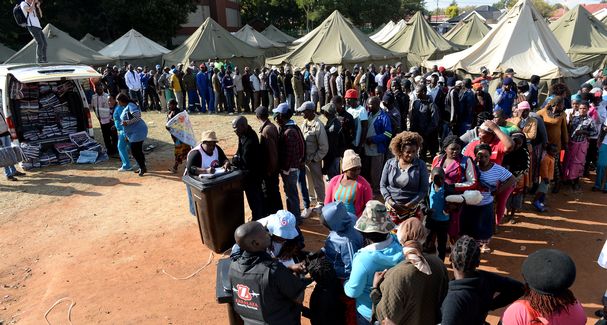
Musina — Giggles echo in the dusty, fenced enclosure which has housed tens of thousands of homeless people, mainly Zimbabwean migrants, seeking greener pastures on the lucrative side of the mighty Limpopo River. Online
Founded in 2005 by a stern Bishop Simon Sithole of “I Believe in Jesus ministries”, the church premises is not famed for its praise and worship services, but as a haven to sleep – almost every square metre is a home for a very needy individual.

Limpopo is sweltering, with temperatures regularly in excess of 40 degrees Celsius. To the children, it is yet another God-granted opportunity to run the taps, get one soaked and run across without a care in the world. There are no toys in sight and the tap can be a remarkable source of entertainment to while away the long days.
But not everyone is in such a playful mood. Mere metres away, pairs of eyes enviously gaze at the frolicking children from the confines of a rickety, shabby old tent which serves as a lounge, bedroom, dining room and a storage closet for nine families with 23 children. The youngest is three-month-old Esperance, born to Democratic Republic of Congo nationals.
Some of the children are sickly and very weak. Many cannot get up. One woman is desperately fanning away flies from her three-year-old child.
The teary woman tells Bishop Sithole that the ailing child had only “had a drink” that Thursday afternoon because there was nothing else to eat. She concentrates on the fanning. Several other children are scattered around the tent.
Diarrhoea has infected their feeble bodies. As many as 10 skinny young children are lying motionless in the tent. The more seriously ill had been taken to a nearby clinic.
- Chamisa under fire over US$120K donation
- Mavhunga puts DeMbare into Chibuku quarterfinals
- Pension funds bet on Cabora Bassa oilfields
- Councils defy govt fire tender directive
Keep Reading
Information from their mothers was that the clinic had referred them to a hospital. The parents do not know where the hospital is and seek directions from the Bishop.
Sithole recounted how the place used to house “more than 2 000 people per night when things were very bad in Zimbabwe”.
A tour to the toilets, escorted by Pastor Saint Charles Alexander, lands one in an overwhelming stench of human excrement where swarms of giant green flies buzz around. The place is unbearable, but it is still used by the desperate camp residents.
“We would need chemicals to clean up the place. Water only is not adequate. We do our best, but we can do with some help,” says Alexander.
Following an eviction from camping outside the United Nations High Commissioners for Refugees offices in Pretoria central, a few days before Christmas, the nine migrant families which have added to numbers at the Musina shelter have resolved to swim against the current and resettle in Zimbabwe.
“In our group, everyone has only one set of clothing which we are going to wear until God-knows-when. We left Pretoria with nothing, but our children. South Africa has indeed rejected us. We do not have any strength anymore. We have tried,” explained Zambian Alex Masuka.
Some within the group which left Pretoria had arrived at the UN offices from Durban. They are mainly Congolese and Burundians.
In that group, a distraught Emmanuel Zigashane said he got separated from his wife and two children in Durban, during the xenophobic violence in March last year and has failed to locate them since.
His friends and countrymen believe he has become “a bit crazy” after a brutal attack left him “half-dead” during the attacks on foreign nationals.










